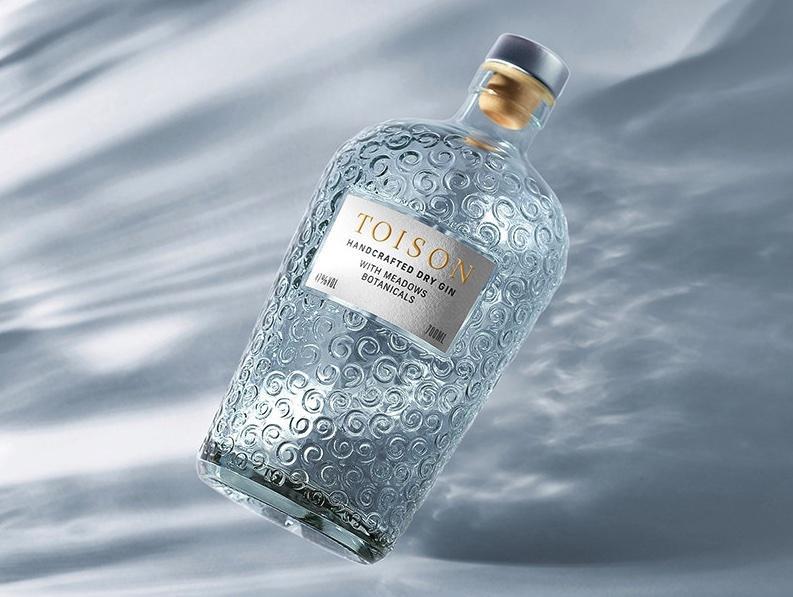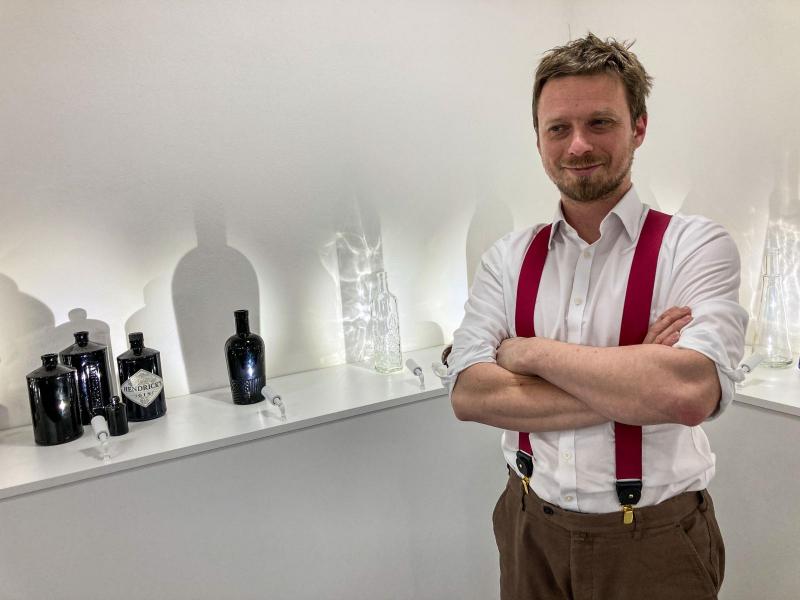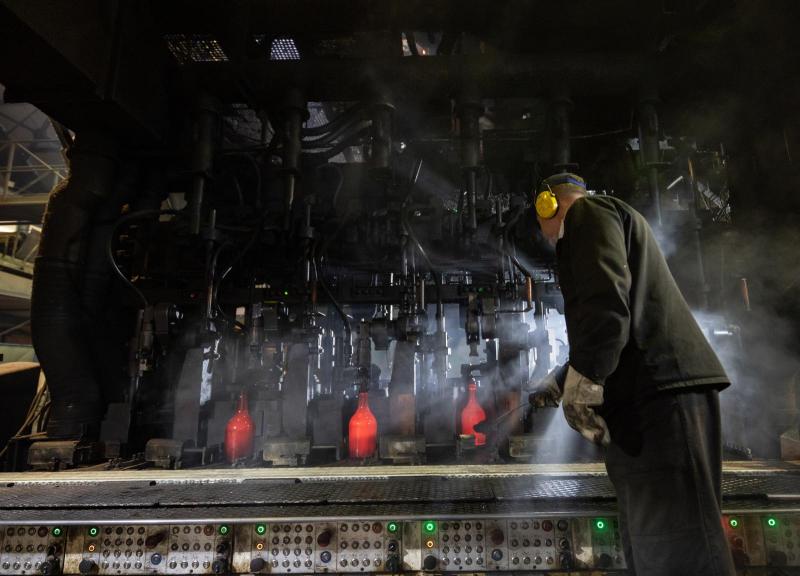Radim Bondy: The current energy crisis is a trial by fire for glass workers
Žufánek, Rudolf Jelínek and Hendrick' s. Moravia Glassworks in remote Úsobrno are the smallest glassworks of their type in the world. Nevertheless, bottles for the most famous global and domestic distilleries are produced here. Even in the fall, however, it looked like one of the furnaces would be shut down due to high gas prices. According to business director Radim Bondy, a graduate of the BUT Faculty of Business and Management, the uniqueness of the products and the willingness of customers to pull together in a crisis kept the company going.
What makes “Sklárny Moravia” so special?
Our history dates back to 1847 and we are the smallest glass factory of this type in the world. We have two hundred employees and two furnaces with a capacity of 40 and 20 tons. Just for comparison - probably the most similar to us is the glass factory in Slovenia, which is three times bigger in size. We are engaged in the production of packaging glass. They are primarily machine-blown bottles for premium alcohol, 90 % of which we export abroad.
We customize most of the bottles according to the customer's needs. We can't compete with mass production and we are not able to make cheap bottles. But we can make beautiful and complicated bottles. Therefore, our customers mainly include producers of more expensive alcohol or local brands producing limited editions.
On the website you state that the most beautiful sound comes from a full bottle. What causes it?
Have you ever carried a crate of empty beers? (laughs) We mean that our bottles are beautiful in themselves. By the way, people upcycle many of them and use them in interiors as vases or original lighting. We work with designers and customers to inscribe their brand's story into the bottles. But it is only when the bottle is filled, labelled and corked that it reaches its aesthetic potential.
Can you give an example of how you incorporated the brand story into the design of the bottle?
We participated in the production of a bottle for Toison craft gin, which is distilled by a small distillery near Trenčianské Teplice in Slovakia. According to the legend, the local thermal springs were discovered by a shepherd looking for a sheep. The name of the gin in French means sheep's fleece, and we also incorporated the symbolism into the bell-shaped bottle. Her design from the pen of the Pergamen studio in Trnava won bronze in the world packaging design competition Pentawards 2020.
We have more prizes to our credit, but it's not about medals. We enjoy it when the product is beautiful and successful. And when a customer reports to us.Toison's award-winning.

Does the design of the bottles also affect the different tastes of the countries to which you export them?
There is a difference between the West and the East, which still tends towards a more conservative design. The product is much more decisive. Wine and whiskey producers rarely want to change the traditional look of the bottles. Rum producers are more open and gin producers are the boldest. Gin is about marketing – it is a very simple alcohol to produce, but the range of possibilities for presenting is even more varied.
Now the trend is to make packaging bottles thinner to make them as light as possible for transport. However, this is not possible in our premium segment - when you buy expensive whiskey for 100 euros, you need to feel the value in your hand.
You took up the position of business director of the glassworks just before covid. What three years have they been?
I went from being a sales and marketing manager to a crisis manager. When I joined, I saw great potential for growth and realization. But covid came and the market situation changed because we export 90 % of our goods abroad. Problems with transport began, including the transatlantic one. As early as November 2021, energy prices began to rise sharply. Then came the war in Ukraine and the energy crisis, which hit us hard. It is a much bigger problem for us than during covid. However, we have not yet received any financial support from the state.

At the end of last year, I read that you were planning to shut down one of the furnaces due to rising energy prices. I thought to myself - this will be a sad conversation. In the end it didn't happen. What happened?
One big customer said goodbye to us and there was a big gap in production programme, which was not easy to fill. The production price of the bottles increased by up to 100 % due to the increase in the price of electricity and gas. At that time, it seemed that we would shut down not only one furnace, but also the other. However, we managed to explain everything well to the customers. They needed the bottles and we needed to survive. If we turned the ovens off, we probably wouldn't turn them on again.
We laid our cards on the table. We showed what a fair price we can offer and asked them - if you can, pay us an extra CZK 2 per bottle. And there were a few who supported us through crowdfunding. A crisis can show who abandons ship quickly and who stays on board through the storm.
The energy crisis is hitting gas-dependent industries hard. Can the glass industry shift to another source over time?
There are experiments with hydrogen furnaces, but the practical use is not certain. Some glass factories are switching to electricity. In my opinion, gas still has a future in all smelters and other smelting devices. And that's also because its consumption will probably recede in areas for which it is technologically easier to adapt.
We now use a mix of natural gas and electric heating in a ratio of 70 to 30. If we wanted to switch to electricity, we would have to build new furnaces, which is an investment of about a billion crowns. In addition, we would need a different electrical voltage infrastructure than the existing one. Even the gas pipeline was once brought to Úsobrno because of the glassworks.

I understand, this is not a flexible industry. Can you take any steps for greener operation and production?
Yes, we are carbon friendly and reduce emissions. We invested in a filter unit for sulphur and nitrogen oxides for 60 million crowns. We reduce the noise and dustiness of our operation. And we also make bottles from 100 % recycled glass. But it needs to be seen in context. If we produce such a bottle, which then travels to the customer, who fills it with mineral water and sends it across half the planet, then in the end it is not an ecological product. Then it's just marketing.
For example, with beer bottles, it is a great pity that they have not remained standardized so that all breweries take them. That's how it is in Germany today. Each brewery now produces its own bottles, and their transportation is thus much more complicated and less ecological.
The last years have literally been a trial by fire for glass factories. How do you see the future?
In 4 years we should celebrate 200 years of existence, which is a unique anniversary. I hope that we will live to see it despite the crises that may still befall us. We will see how the world economy will develop and whether the state will also support us.
However, our production is unique, so it can find a place on the market. That is why we are always looking for new colleagues - IT architects, engineers, technologists, chemists. We know that it is a specific field, so there are not too many ready-made people on the market. But that doesn't matter, we are happy to share our know-how, all you need is the desire to learn new things.
| Published | |
|---|---|
| Link | https://www.vut.cz/en/alumni/f38144/d236938 |
Responsibility: Mgr. Marta Vaňková